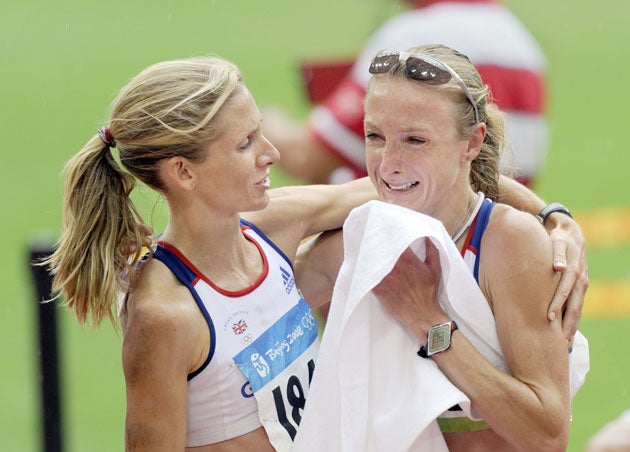Radcliffe's quest for ultimate glory brings pain

That the 2008 Olympic marathon would end in tears for Paula Radcliffe was not hard to predict. From the moment this 34-year-old embodiment of British stubbornness – and of stubborn Britishness – set her mind to compete in Beijing against all medical advice her course was set.
And so it came to pass that, three months after being diagnosed with a stress fracture of her left thigh, the world record holder reeled home in 23rd place, haggard with discomfort, drawn with pain, having stopped temporarily after 24 miles to ease the stiffness in her malfunctioning leg. It appeared to be not so much a Pyrrhic victory as a Pyrrhic defeat.
But while Radcliffe had cried in the gutter during the Athens 2004 marathon after staggering to a halt with four miles remaining, here the wellsprings of emotion opened at a crucially important part of the course – five strides over the finish line.
As Radcliffe admitted earlier this month, the suggestion in some of the more reactionary areas of the media after her Athens meltdown that she was a "quitter" hurt her more deeply than she was willing to own at the time. While her physical distress four summers ago – brought on by a reaction to anti-inflammatories she had taken to help a calf injury – was palpable, the damage to her psyche was profound.
The word was before this race that Gary Lough, Radcliffe's irascible but hugely protective husband and manager, had not been in favour of her risking herself in pursuit of an Olympic medal for the fourth time of asking. Three months down the line, with an adequate amount of training in her legs, she could have looked to return for another uplifting victory in the New York marathon.
But she could not bring herself to do that. Indeed, in the aftermath of her latest attempt to reach the Olympic podium, she admitted that she would have walked if necessary to ensure that she reached the stadium. Nobody was going to say she was a quitter in this Olympic marathon.
"Yeah, I would have walked," she said. "It would probably have been better and less painful walking. But hopefully I haven't made the old injury worse because that means I can come back."
Asked if she felt she had to finish no matter what, she thought for a moment before responding : "No. If I felt I was really doing damage I would have stopped. But it is horrible when you have to drop out especially when it is the Olympic Games. So many people have worked hard to get me here. And in some ways it is quicker to keep going because you are just left out there on your own if you stop somewhere."
This time she reached the finish on foot rather than by ambulance. And as she embraced her childhood friend and training partner Liz Yelling, who had finished three places behind her after falling heavily – she later required hospital treatment for a rib injury – Radcliffe's face was contorted with a welter of emotions.
Radcliffe insists she will make one final attempt to earn that Olympic medal four years down the line in London, pointing out that she will then be 38 – the same age as yesterday's winner, Romania's Constantina Tomescu.
Ironically, after all the angst about the killing conditions that would occur during this marathon, the race took place on a cool morning without obvious smog or haze, and even the odd sprinkling or rain. It was a day made for Radcliffe – but a fit Radcliffe. In the manifest absence of that, it was another European who profited from the benign conditions to win by grinding down the rest of the field with her front-running before finishing in 2hr 26min 44sec. In other words, winning it the Radcliffe way.
The British runner who came closest to podium on the day was Mara Yamauchi, who had finished fifth in a test event on this course. Yamauchi eventually finished sixth in 2 :27.29. It was the best performance by a British woman since the women's marathon was first run at the Olympics in 1984, equalling Priscilla Welch's achievement of that year. Could Radcliffe improve that statistic four years hence ? Don't bet against it.
Join our commenting forum
Join thought-provoking conversations, follow other Independent readers and see their replies
Comments
Bookmark popover
Removed from bookmarks